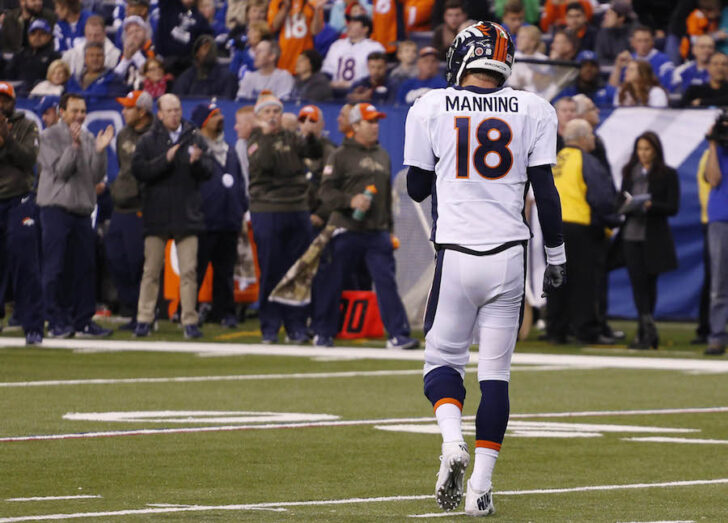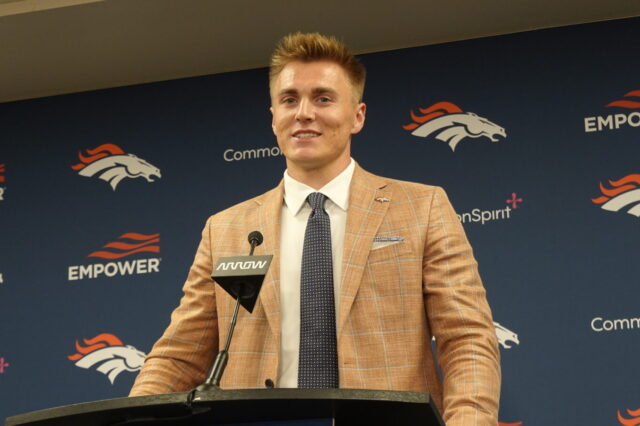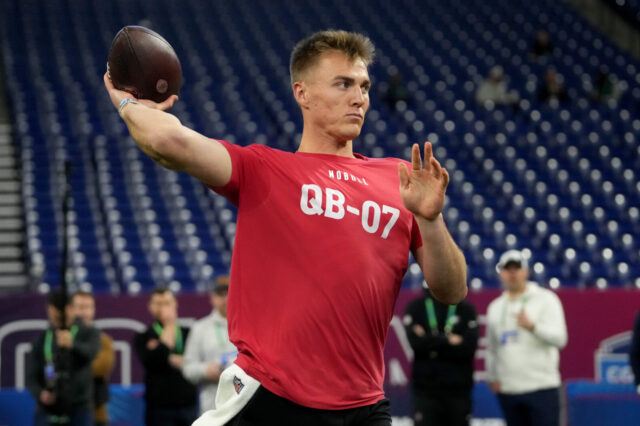For the second straight week, Brock Osweiler will start at quarterback for the Denver Broncos. As a result, it’s becoming evident that he’s going to be the team’s starter for the rest of the season.
At the same time, it’s looking more and more like Peyton Manning has already turned his sights toward 2016.
On Sunday night, Mike Florio from Pro Football Talk reported that the Broncos quarterback was going to play again next season, even if it’s not in Denver. The prevailing wisdom is that the Manning camp released this nugget of information in order to send the message that a) the QB doesn’t believe he should be sitting this year and b) he won’t be forced into retirement by John Elway and Company.
And then today, Gary Kubiak revealed during his weekly Monday morning press conference that Manning was in Charlotte today to seek a second opinion on his injured foot. While that could be 100 percent above the board, it also reeks of a convenient way for the Broncos and their quarterback to get some unexpected news that forces Manning onto the team’s injured reserve list for the rest of the season.
Why would that be the direction that both parties want to go? Because it avoids the awkward situation of seeing one of the greatest quarterbacks in NFL history holding a clipboard for the rest of 2015 and it allows the team to turn the page without the distraction of Manning Watch every single week. It’s the path of least resistance for both sides.
While that might make some sense on a lot of practical levels, it’s also disappointing. Manning is supposed to be one of the good guys; he’s a player who handles every situation correctly, carrying himself in a professional manner at every turn. But this feels like an entitled, pampered, prima donna athlete taking his ball and going home as soon as something doesn’t go his way.
At some point in everyone’s athletic career, they are forced to sit behind someone that they don’t think is a better player; it’s almost a rite of passage to bide time behind the senior, the coach’s kid or the guy who has parents that write big, fat checks to the school. And while it’s a bummer at the time, it teaches the athlete getting the short end of the stick some important lessons.
For one thing, it shows that life isn’t always fair. Everyone would like the real world to be a meritocracy, but that’s not the way it works. At times, political motivations dictate decisions; learn to deal with it.
It also reinforces the notion of preparedness. It’s easy to be ready to go when you know you’re going to play; it’s much more difficult to be dialed in when there’s a pretty good chance that you’ll never see the field, court or ice.
And most importantly, it teaches that humility is sometimes an important attribute in being a good teammate. The goal is to win the game, not to achieve individual glory; checking your ego at the door is sometimes required in that pursuit.
For most of his life, Manning hasn’t had to deal with these things. He’s the son of an NFL star, so he had no trouble getting onto the field. He’s always been a marquee player, so he didn’t have to prep in a backup role. And he’s been the center of attention, never having to fill a lesser role for the good of the team.
There’s nothing wrong with that, per se. God bless him for having that kind of good fortune. But now that fate has dealt him a slightly less favorable hand, it’ll be disappointing if he doesn’t exhibit the traits we expect from someone of his stature.
I want to hear that Manning is at Dove Valley, attending meetings and helping Brock Osweiler prep for the upcoming game. I want to see No. 18 standing on the sidelines, encouraging his teammates and serving the role of cheerleader. And I want to watch one of the greatest QBs of all-time come off the bench to lead a big drive when called upon.
Throughout his career, Manning has been a shining example that parents and coaches can use to show young athletes how they are supposed to work and play. In the waning moments of his career, he can continue to do the same thing, just in a different way; showing how to properly deal with adversity is an important lesson, too.
It’s understandable that the competitive fire inside Manning still burns; that’s what makes him want to get back on the field this season and it’s what will drive him to play elsewhere in 2016. But that burning desire can’t cloud the quarterback’s vision; and it doesn’t excuse bad behavior, either.
Should the Broncos have gone with Osweiler over Manning? That’s beside the point. The head coach made that call. The players are supposed to accept it, get in line and keeping working toward their next opportunity.
Just because your name is Peyton Manning doesn’t make you above such things. In fact, it actually creates a responsibility to do them properly.



